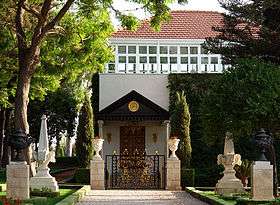Birth of Bahá'u'lláh

The Birth of Bahá'u'lláh is one of nine holy days in the Bahá'í calendar that is celebrated by Bahá'ís and during which work is suspended.[1][2] The holy day celebrates the birth of Bahá'u'lláh, the founder of the Bahá'í Faith. The 2016 date is November 2.[3]
Bahá'u'lláh was born on 12 November 1817 in Tehran, Iran,[4] and this holy day was instituted in the Kitáb-i-Aqdas, his book of laws, where Bahá'u'lláh first refers to four great festivals: the Festival of Ridván, the Declaration of the Báb, the birth of the Báb—who is considered to be a Manifestation of God, and who foretold the coming of Bahá'u'lláh—and the birth of Bahá'u'lláh.[5] In questions submitted to Bahá'u'lláh after writing the Kitáb-i-Aqdas, Bahá'u'lláh states that the two days commemorating the births of the Báb and Bahá'u'lláh are seen to be one in the "sight of God" and are referred to as the "Twin Birthdays".[6][7]
`Abdu'l-Bahá, the son of Bahá'u'lláh, stated that during the holy day the community should rejoice together to increase the unity of the community.[8] Bahá'ís usually observe the holy day with community gatherings where prayers are shared and the birth of Bahá'u'lláh is celebrated. Bahá'u'lláh stated that in communities where the majority of the population are Shi'a Muslims, such as Iran, his followers should exercise caution in celebrating the twin birthdays so that they do not upset the majority of the population who are mourning during the Islamic month of Muharram.[9]
In the Islamic calendar, which is a lunar calendar, the two holy days fall on consecutive days: the birth of the Báb is on the first day of Muharram in 1235 AH (20 October 1819), and the birth of Bahá'u'lláh is on the second day of Muharram in 1233 AH (12 November 1817).[7][9] Bahá'u'lláh stated that if the holy days occur during the Bahá'í month of fasting, Bahá'ís need not observe the fast those days.[7]
Since the Bahá'í calendar is a solar calendar, the decision to celebrate the Twin Holy Birthdays in a solar or lunar basis remains to the Universal House of Justice.[7] Until March 20, 2015, in most of the world, the holy day was celebrated according to the solar year on 12 November, and the birth of the Báb was celebrated on 20 October.[2] Since days in the Bahá'í calendar start at sunset, the holy day started on the evening of 11 November and proceeded until sunset on 12 November.
However, in 2014, the Universal House of Justice decided to celebrate the twin holy days on the first and second day following the eighth new moon after Naw-Rúz, starting from March 20, 2015 onwards.[10] Thus from March 20, 2015 onward the day where the Birth of Bahá'u'lláh is celebrated will change from year to year.
References
- ↑ Smith, Peter (2000). "holy days". A concise encyclopedia of the Bahá'í Faith. Oxford: Oneworld Publications. pp. 182–183. ISBN 1-85168-184-1.
- 1 2 Esslemont, J.E. (1980). Bahá'u'lláh and the New Era (5th ed.). Wilmette, Illinois, USA: Bahá'í Publishing Trust. pp. 182–183. ISBN 0-87743-160-4.
- ↑ http://bahaiblog.net/site/bahai-calendar/
- ↑ Nigosian, Solomon A. (1994). "Chapter 15". World Faiths. New York: St. Martin's Press. pp. 459–470.
- ↑ Bahá'u'lláh (1992) [1873]. The Kitáb-i-Aqdas: The Most Holy Book. Wilmette, Illinois, USA: Bahá'í Publishing Trust. p. 59. ISBN 0-85398-999-0.
- ↑ Bahá'u'lláh (1992) [1873]. The Kitáb-i-Aqdas: The Most Holy Book. Wilmette, Illinois, USA: Bahá'í Publishing Trust. p. 105. ISBN 0-85398-999-0.
- 1 2 3 4 Universal House of Justice (1992). "Notes". The Kitáb-i-Aqdas: The Most Holy Book. Wilmette, Illinois, USA: Bahá'í Publishing Trust. pp. 224–225. ISBN 0-85398-999-0.
- ↑ National Spiritual Assembly of the Bahá'ís of the United States. Developing Distinctive Bahá'í Communities.
- 1 2 Taherzadeh, Adib (1987). The Revelation of Bahá'u'lláh, Volume 4: Mazra'ih & Bahji 1877-92. Oxford, UK: George Ronald. pp. 334–5. ISBN 0-85398-270-8.
- ↑ The Universal House of Justice (2014-07-10). "To the Bahá'ís of the World". Retrieved 2014-07-10.
